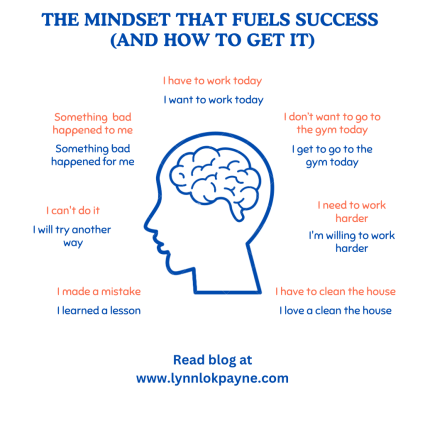In a world full of challenges and setbacks, the way we approach these obstacles plays a pivotal role in determining our mindset which defines our success and happiness.
One powerful concept that has been gaining traction in personal development circles is the growth mindset. Coined by psychologist Carol Dweck, this idea is simple yet profound: with the right mindset, we can transform the way we respond to difficulties, learn from failures, and ultimately achieve greater success.
The Difference Between Fixed and Growth Mindset
At the core of this concept lies a fundamental distinction between two types of mindsets: fixed and growth.
- Fixed Mindset: Those with a fixed mindset believe that their abilities, intelligence, and talents are static—that you’re either born with them or you’re not. This leads to a fear of failure, a tendency to avoid challenges, and a reluctance to try new things for fear of not being “good enough.”
- Growth Mindset: On the other hand, people with a growth mindset believe that abilities can be developed over time through effort, learning, and perseverance. They embrace challenges, view failures as opportunities for growth, and believe that hard work and resilience will lead to improvement.
Shifting from a fixed mindset to a growth mindset isn’t just a mental shift—it’s a lifestyle change. It requires conscious effort and practice, but the benefits are profound. Research shows that individuals with a growth mindset are more resilient, more likely to reach their goals, and overall, report higher levels of satisfaction in life.
How to Cultivate a Growth Mindset
- Embrace Challenges: People with a growth mindset actively seek out challenges. Instead of shying away from difficult situations, they see them as opportunities to learn and grow. So next time you face a tough situation, ask yourself: “What can I learn from this?”
- Focus on Effort, Not Just Results: It’s easy to feel defeated when outcomes don’t match expectations, but the process is just as important as the destination. Celebrate the effort and improvement, no matter how small. This reinforces the belief that progress comes through persistence.
- Learn from Criticism: Constructive feedback is a valuable tool for growth. Instead of seeing it as a personal attack, use it as a roadmap for where you can improve. A growth mindset thrives on continual learning.
- Celebrate the Success of Others: People with a fixed mindset may feel threatened by others’ success, but those with a growth mindset are inspired by it. Use others’ achievements as a reminder that growth is possible for everyone, including you.
The Power of Positive Thinking: A Simple Practice for Mental Well-Being
In addition to a growth mindset, another powerful mental tool is positive thinking. While it might seem like an overly simplistic approach, research has shown that cultivating a positive mindset can have significant benefits for mental health and well-being. It can lower stress levels, enhance resilience, and even improve relationships.
But what does it really mean to “think positively,” and how can you start implementing it in your life?
What is Positive Thinking?
Positive thinking doesn’t mean ignoring life’s challenges or pretending everything is perfect. It’s about approaching life’s hurdles with a hopeful attitude, believing that you can overcome them, and focusing on the possibilities rather than the limitations.
The impact of positive thinking extends beyond just emotional health. Studies have shown that people who maintain an optimistic outlook tend to have better physical health, lower levels of anxiety, and even a longer lifespan.
Practical Tips for Incorporating Positive Thinking
- Practice Gratitude Daily: Take a moment each day to write down three things you’re grateful for. It’s a simple habit that helps shift your focus from what’s going wrong to what’s going right. Over time, this builds a more positive mindset.
- Challenge Negative Thoughts: When you catch yourself thinking negatively—whether about yourself or a situation—pause and ask if the thought is based on facts or assumptions. Challenge its validity. Are they true? Replace negativity with more balanced, optimistic perspectives. Check out my book, Speak This Not That, revise common negative thought patterns.
- Surround Yourself with Positivity: The people, media, and environments you expose yourself to have a huge influence on your mindset. Surround yourself with positive influences—whether it’s uplifting books, motivational podcasts, or supportive friends—and remove negativity, or at least spend less time with it, wherever possible.
- Visualize Success: Take a few minutes each day to visualize yourself successfully navigating challenges and achieving your goals. This mental rehearsal boosts confidence and reinforces the belief that success is achievable.
- Affirmations: Positive affirmations are powerful tools for changing the narrative you tell yourself. Repeating phrases like, “I am capable,” or “I am deserving of success,” helps rewire your brain for positivity. All my books contain positive affirmations to inspire you to reframe negative thoughts.
Overcoming Self-Doubt and Imposter Syndrome
Despite all our best efforts to foster a positive mindset and embrace growth, self-doubt can still creep in. All of us experience this from time to time. Whether it’s imposter syndrome—the feeling that you don’t belong or are undeserving of your achievements—or simply questioning your abilities, self-doubt can paralyze progress and stunt growth.
The good news is, overcoming self-doubt is possible. The key is recognizing that self-doubt is normal, but it doesn’t have to define you.
Recognizing Self-Doubt
Self-doubt can show up in various forms:
- Imposter Syndrome: A belief that you don’t deserve your achievements, often paired with a fear of being “found out” as a fraud.
- Perfectionism: The fear of making mistakes, leading to procrastination or avoidance of important tasks.
- Negative Self-Talk: Constantly doubting your abilities or believing you’re not “good enough” compared to others.
Strategies to Combat Self-Doubt
- Acknowledge and Reframe: Instead of ignoring or repressing your self-doubt, acknowledge it. Ask yourself: “What’s causing this doubt? Is it based on facts or just fear?” Reframe the situation by focusing on the progress you’ve made and the evidence of your capabilities.
- Celebrate Small Wins: When you doubt yourself, it’s often because you focus on what you haven’t accomplished yet. Counteract this by celebrating even the small victories along the way. Recognize your progress, however incremental it may seem.
- Talk to Mentors or Trusted Friends: Sometimes, sharing your feelings with someone else can help you gain perspective. Often, others see your strengths more clearly than you do, and their validation can help counter feelings of inadequacy.
- Stop Comparing Yourself to Others: Imposter syndrome is often fueled by comparing yourself to others. Focus on your unique journey and achievements. Everyone has a different path, and comparing yours to someone else’s is counterproductive.
- Practice Self-Compassion: Be kind to yourself when you fall short. Self-doubt thrives in an environment of self-criticism, so give yourself the same grace you would give a friend.
- Action Over Perfection: Perfectionism fuels self-doubt. Instead of waiting for the “perfect” moment or perfect set of skills, focus on taking action. Every step you take, no matter how imperfect, builds confidence and momentum.
Final Thoughts
Cultivating a growth mindset, practicing positive thinking, and overcoming self-doubt are interconnected pillars that can dramatically transform your life. By shifting your mindset from a fixed to a growth-oriented one, embracing positivity, and confronting self-doubt head-on, you unlock your true potential.
Remember, personal growth isn’t a linear path—it’s a journey with its ups and downs. The key is to keep moving forward, learning from each experience, and trusting in your ability to grow and improve.
The good news is, with consistent effort, you can change your mindset, and that shift can lead to a more fulfilling, successful, and joyful life. I know it has for me!
lhttps://lynnlokpayne.com/5-simple-steps-to-a-growth-mindset/





